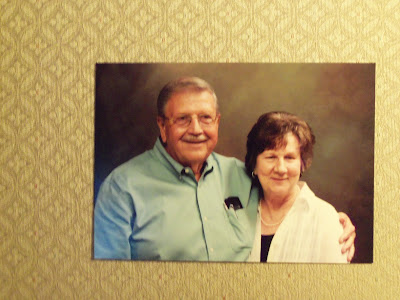A WARRIOR AND A GENTLEMAN
Two full-time RV couples, both from Greensboro, but unknown
to each other, camped side by side at Hagan-Stone RV Park. Deluges came, both RVs bogged down to their
axles. The other couple was bogged down
in a custom-made Foretravel bus. My wife
and I were bogged down in a Winnebago.
 |
| DAVID & DAWN CARTER |
With their help, the Winnie finally tracked out to dry
land. With our help, their Foretravel
sank deeper, eventually bog-extracted by a biggie-sized tow vehicle.
Fast forward two RV lifetimes, the Foretravelers and the Winnie
couples find themselves living side by side – unknowingly -- in Greensboro
villas. As is too often the case, only
after David Carter died did I realize what I had missed by not knowing him
better. Or, by asking a few questions.
Those at Greensboro’s Curry High School knew Carter
well. They had an inkling he would be
successful, seeing that he was Senior Class president, school newspaper editor,
Key Club, Curry Club, Quill & Scroll, lettered in football and track, and
more.
However, it is doubtful his Curry classmates had any inkling
Carter would join the National Guard even before finishing high school in
1956. After all, his parents were
Quakers. His father was pastor of Glenwood
Friends Meeting.
Local trivia buffs can have their say about Curry School,
but here are a few hints. Named after a
financial supporter, Jabez Curry, the neighborhood school opened in 1902 and
closed in 1970. It offered practical
experience for students and practice teachers at UNCG.
For those thinking Carter would opt for college, they were
correct, but their timing was off.
During twenty-four years of Army service, he earned a BA degree from the
University of Nebraska and a master’s degree from the University of Utah.
After advancing from private to Specialist 5, David Carter
completed Officer Candidate School and was commissioned as a 2nd
Lieutenant. Already a paratrooper and
Green Beret, Carter earned his wings as a helicopter pilot. He was a helicopter flight instructor before
his first deployment to Vietnam.
Carter’s combat tours can almost be date-lined by his litany
of personal awards. In September, 1967,
he was presented a bronze star for meritorious service during ground
operations.
In March, 1968, he was awarded a purple heart for wounds
received in combat. In July, 1968, he
won a distinguished flying cross for heroism in aerial flight.
In August, 1968, Carter volunteered to take his Chinook
helicopter on a dangerous night-time resupply mission to a forward
position. Weather forced gunship escorts
to turn back, but Carter completed the mission in the face of withering
artillery, small arms and machine gun fire.
As a result of this mission, Major General Melvin Zais,
commanding general of the 101st Airborne Division, presented Carter
a silver star, the nation’s third highest valor award.
 |
Carter survived five helicopter crashes – three from enemy
fire and two from other causes. He wrote
later regarding his retirement, “The Army decided it was cheaper to pay me a
pension than to keep me flying!”
He made at least one unscheduled trip back to the States
while serving in Vietnam, but it wasn’t to his liking. He was tasked to escort the remains of a
fallen friend.
 |
| DAVID CARTER SERVED WITH VALOR & DISTINCTION |
Carter earned the incredible number of fifty-seven air
medals, with valor device, representing meritorious service in combat involving
aerial flight. He was a master aviator
and master parachutist, and expert marksman with seven different weapons.
Commanding both air and ground forces, he was awarded two
army commendation medals and a meritorious service medal for Vietnam service,
as well as gallantry awards from the Republic of Vietnam.
A naval officer who served with Carter acknowledged his vast
array of personal decorations, “But what impressed me more -- David Carter was
a gentleman, he did not smoke, drink or use vile language -- he never wavered
from his Quaker values.”
In the early seventies, Carter completed the 82nd
Airborne Jumpmaster Course, Special Forces Officers School, and was promoted to
Lieutenant Colonel.
 |
| CARTER'S PERSONAL AWARDS WERE UNIQUELY UNIQUE |
He was selected as a
member of the National Emergency Airborne Command Post (NEACP) battle
staff. Known colloquially as the
doomsday aircraft of the cold war era, U.S. forces could be commanded from this
aircraft in case of an extreme national emergency.
After his military retirement, Carter founded an insurance
and investment firm, which he and his wife operated successfully for over
twenty-five years. In addition to his
wife, he left three sons, two daughters, and three grandchildren. To them, he left a military, moral, and
entrepreneurial heritage like few others.
Memorial Day (2013), was the family’s first after
Carter’s death. While David Carter died
unexpectedly, he left his affairs in impeccable order. It would not be surprising to learn he left
specific instructions for his progeny’s first Memorial Day observance without
him.

No comments:
Post a Comment